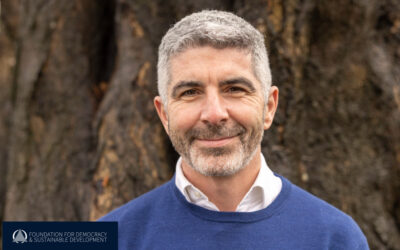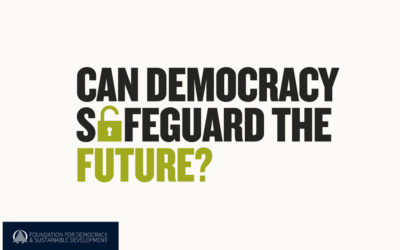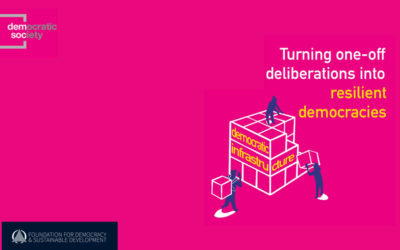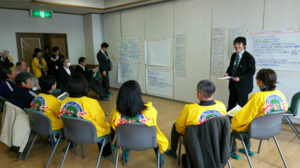New political institutions and major reforms of existing institutions are likely to be necessary for democracies to be able to take a longer-term perspective or tackle complex multi-faceted challenges. There are existing examples around the world that are part of national or local parliaments, or work as independent or semi-independent watchdogs and advocates. Such bodies have a range of powers, from commenting on, and even vetoing, laws and policies that conflict with sustainable development and the interests of future generations, to providing advice and research.
Within the UK, for example, Wales, through its Well-being of Future Generations (Wales) Act, established an Office for Future Generations, and the implications of the goals set, is leading to changes in local and national administration.
In March 2018 FDSD proposed a House of Lords Committee on Future Generations as a pragmatic prelude to consideration of wider parliamentary reforms and is part of the Steering Group for the Today for Tomorrow Campaign, and proposed Well-being of Future Generations Bill. There is also an All-Parliamentary Group for Future Generations which was informed partly by a report discussing the Rights and Representation of Future Generations in United Kingdom Policy-Making.
A key challenge going forward is to consider how such institutions can have impact and fit within democratic political systems, even while incorporating appropriate democratic principles, particularly of participation. “The Democratic Case for an Office for Future Generations” argues for the need to carefully consider and enhance the democratic legitimacy and design of future-oriented institutions as part of wider democratic system change.
Policy-making
The civil service and policy making at national and local level will also need to adapt in order to deliver effectively on these complex issues, and new forms of governance, at different geographical or sectoral levels, may be necessary to engage people and stakeholders around policy and practice design and implementation.
Many sustainability problems and desired outcomes cross-cut traditional policy areas. At the same time, the multiple dimensions and goals of sustainable development have highlighted the inadequacies of some traditional policy tools: over-reliance on economic models for planning, policy choice and measuring success; difficulties in incorporating future needs; and inadequate opportunities for broader participation in decision-making.
Multi-level governance may also be needed in order to deliver policies and targets at the appropriate spatial level, as well as across different economic sectors. Developing a functional framework of multi-level governance enables coherent coordination between different levels of governance and a variety of non-governmental stakeholders.
Resources and examples
Two useful 2016 books cover examples of political institutions: Institutions for Future Generations by Iñigo González-Ricoy and Axel Gosseries; and Jonathan Boston, Governing for the Future: Designing Democratic Institutions for a Better Tomorrow, for which Graham Smith, Chair of Trustees, has written a review.
The Hungarian Parliament’s Deputy Commissioner for Fundamental Rights or ‘Ombudsman for Future Generations’ is responsible for protecting the interests of future generations. He or she can given an opinion on draft laws and policies affecting future generations; and can be petitioned by people feeling that the relevant constitutional rights have been affected, with the potential for review in the Constitutional Court.
The Committee for the Future in the Finnish Parliament is made up of 17 parliamentarians from all political parties. Their focus is primarily on the future, and through this lens comment on government policies and conduct research on future issues including participatory methods such as hearings, or crowd-sourcing. Their outputs are generally considered by the Finnish Assembly.
The Commissioner of the Environment and Sustainable Development, Canada provides “parliamentarians with objective, independent analysis and recommendations on the federal government’s efforts to protect the environment and foster sustainable development.” The Commissioner conducts performance audits, monitors federal department SD strategies and monitors environmental petitions.
In February 2012, FDSD, in partnership with the World Future Council, published ideas for “The Mandate of a UN High Commissioner for Future Generations” to contribute to Rio+20, following this with a detailed discussion document ‘Committing to the Future we want: a High Commissioner for Future Generations at Rio+20‘. Together with with WWF-UK, we also explored possible institutions and related governance changes for the UK in “Taking the longer view: UK governance options for a finite planet”.
An example of multi-level governance in action is the Spanish Network of Towns and Villages towards Sustainability (Xarxa de Ciutats i Pobles cap a la Sostenibilitat). This network consists of a group of neighbouring municipalities cooperating on shared needs. The working groups within the network are appointed technical staff recruited from regional and national levels, along with academic and business experts: together they work to find local approaches to applying national laws. Such interconnected efforts can provide robust frameworks for promoting sustainable development.
A Multi-criteria Mapping Tool has been developed at the University of Sussex to be “an interactive, multicriteria appraisal method for exploring contrasting perspectives on complex, uncertain and contested issues.” The tool engages directly with the challenging trade-offs that confront decision-makers and people participating in such discussions.










